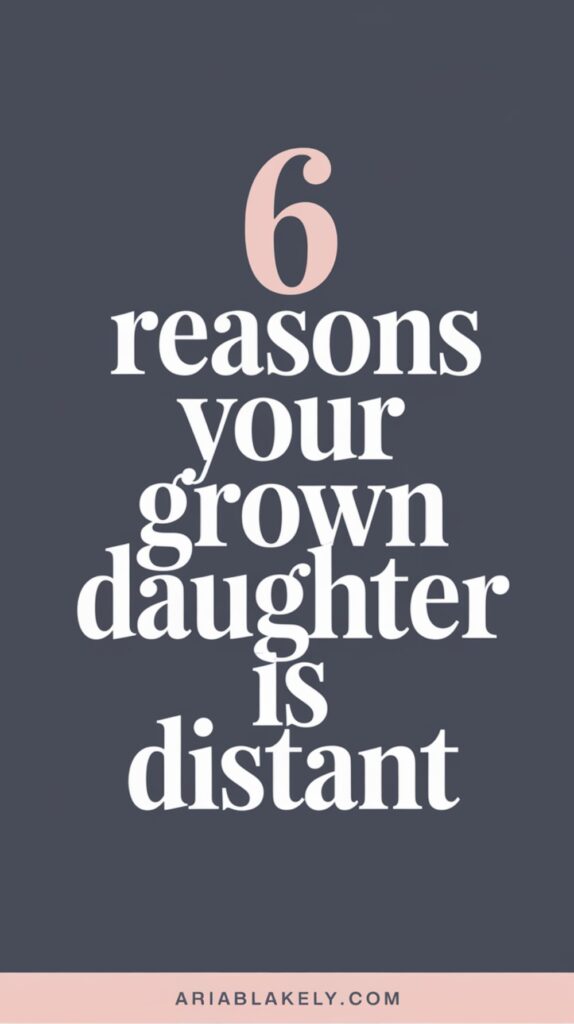Have you ever found yourself wondering, “Why is my grown daughter suddenly so distant and cold?” It can feel heartbreaking, right? One minute you’re sharing laughs and heartfelt conversations, and the NEXT, you’re walking on eggshells, trying to avoid yet another argument…
Honestly, it’s one of the toughest things a parent can experience.
First off, know that you’re not alone in this. Many parents go through phases of strained relationships with their adult daughters, and understanding why can be the first big step toward healing.
Often, it’s not just one issue but a complicated mix of past hurts, misunderstood expectations, and evolving identities.
Let’s dive into some of the real reasons your grown daughter might seem distant, and TRUST me, some of these might surprise you!
1. The Silent Pressure of Childhood Expectations

Was your daughter always “the responsible one,” the kid who did everything right, got good grades, and never rocked the boat?
While you probably felt incredibly proud (who wouldn’t?), she might have secretly carried a heavy burden, feeling like she had to be perfect to earn your approval.
As an adult, she might resent feeling robbed of a carefree childhood.
Her current distance might be her way of reclaiming autonomy, making it clear she’s tired of meeting everyone else’s expectations.
It’s less about being mean and more about finally setting boundaries.
2. Struggling with Emotions She Can’t Express
Maybe your daughter never learned how to effectively handle tough emotions like frustration or sadness.
When life inevitably gets overwhelming (career stress, relationship issues, financial strain), she might lash out at you, simply because you’re a SAFE place to release bottled-up feelings.
Her sharp words or irritability aren’t necessarily aimed at you personally, but rather an emotional explosion she can’t control.
She’s likely hurting deeply and hasn’t figured out a healthier way to express it yet.
3. The Consequences of Over-Permissiveness

On the flip side, if your parenting style was overly permissive, giving her everything she wanted without teaching her to handle disappointment, she might be feeling unprepared for life’s harsher realities.
Adult life can feel brutally unfair to someone who hasn’t learned resilience early on.
She may project blame onto you for her struggles, feeling you didn’t equip her with the tools to manage adult challenges.
It’s painful BUT important to recognize she’s reacting out of frustration, not hatred.
4. Asserting Her Independence
As daughters grow up, establishing their identity separate from their parents is essential.
If you’re still seeing her as “your child” rather than a capable adult, she might feel infantilized and resentful.
How this shows up now: Her distancing or “meanness” could be her way of proving her independence and urging you to see her as the grown woman she truly is.
5. Lingering Effects of Strict Parenting

If you were a strict parent, enforcing rigid rules without open dialogue, your daughter might have grown up feeling controlled or misunderstood.
Now, she’s trying to assert control she never had.
She may become secretive or confrontational, pushing back against perceived attempts to control her adult decisions.
It’s less personal and more about past wounds surfacing.
6. Hidden Emotional Wounds
Sometimes, her distance isn’t about you directly.
Unresolved trauma or emotional pain, from childhood or more recent experiences, can deeply affect her interactions with loved ones.
She might lash out not because she dislikes you, but because her emotional pain is overwhelming.
This is a sign she may need support or professional help.
How to Rebuild the Connection

Healing your relationship is a journey requiring empathy, patience, and open-hearted conversations. Here are some steps you can take right away:
- Start a gentle, non-defensive conversation: Share your feelings honestly, using “I” statements like, “I miss our closeness, and I’d love to understand what’s happening between us.”
- Listen deeply and without interrupting: Validate her feelings, even if it’s hard to hear. It can create space for genuine understanding.
- Recognize and respect her adulthood: Shift your interactions to reflect mutual respect and autonomy. She needs to feel seen as the adult she’s become.
- Apologize sincerely if needed: If you realize you’ve hurt her, clearly acknowledge this without justifying your actions.
- Consider seeking professional help: Therapists or family counselors can offer neutral ground to explore deeper issues safely.
Remember, your daughter’s behavior is a symptom, not the cause.
By addressing the deeper reasons behind her distance, you have the chance to rebuild your connection into something even stronger and more genuine.
Above all, keep believing in the possibility of reconciliation, because love and empathy truly have the power to heal.
If this resonated with you, we’d LOVE to hear your story. Leave a comment below, share this with someone who might need it, and don’t forget to save it for later—you never know when these words might help again! 💛


